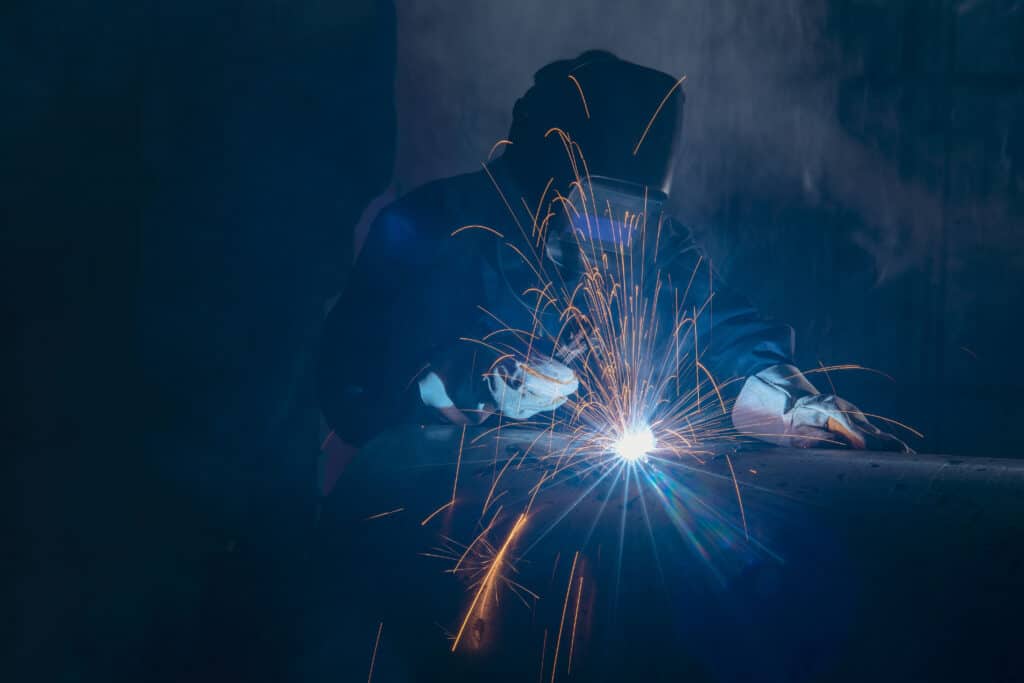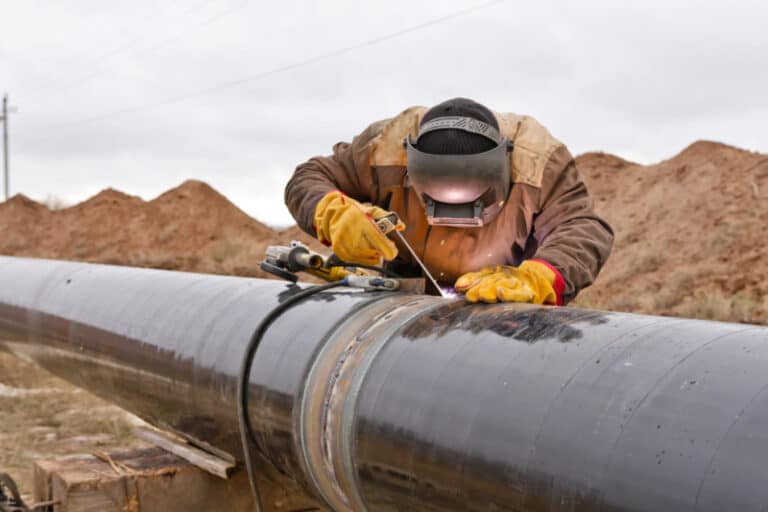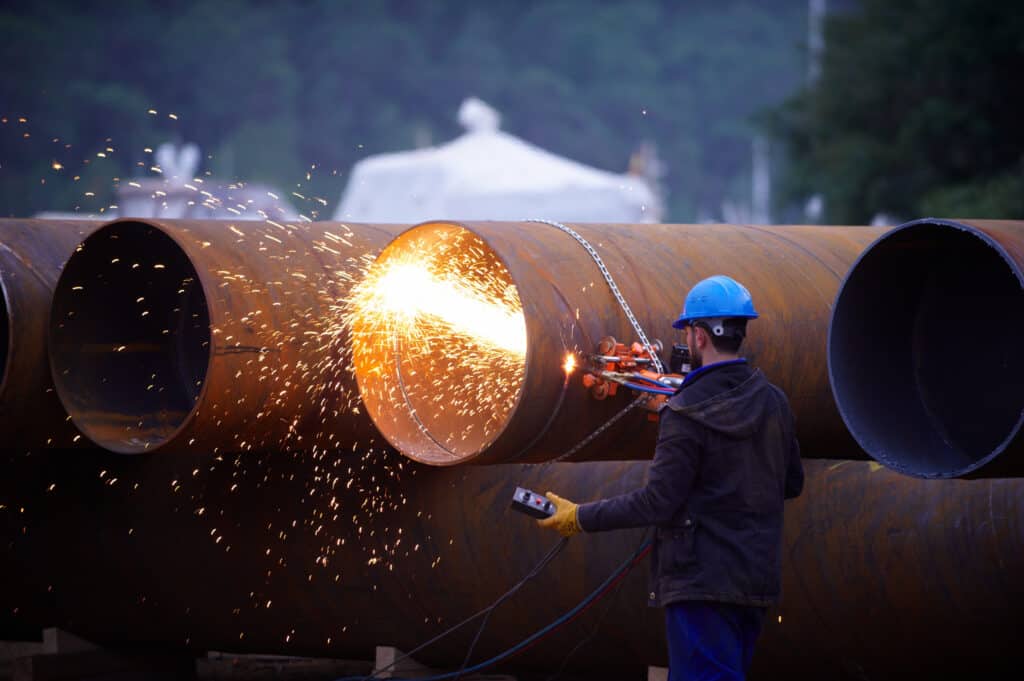THE HIGH-PRESSURE WELDER JOB
OUR HIGH-PRESSURE WELDER JOB OFFERS
Training to Become a High-Pressure Welder
To secure high-pressure welder jobs, extensive experience and specialized training are necessary. It is crucial to pass a qualification exam to obtain certification and work in the industry. Accredited organizations must provide training, which should include courses on high-pressure welding procedures and practices, as well as hands-on and theoretical training on using specific equipment like oxygen acetylene torches and maintaining workplace safety.
In this context, there is a 600 hour (6-month) professional specialization certificate in high-pressure welding. To access it and officially become a high-pressure welder, you must meet one of the following three conditions:
- Hold a professional diploma in welding assembly or general welding;
- Have a job directly related to this particular program;
- Hold a professional welding study certificate and equivalent work experience or obtain official recognition of equivalent learning.

Skills Required for High-Pressure Welder Jobs
The skills and abilities required for high-pressure welder jobs are as numerous as they are diverse. To excel in this profession, one must have a solid understanding of welding processes and techniques. Additionally, a thorough comprehension of safety and quality standards, along with the capacity to apply them practically in one's duties, is essential.
It is also crucial to possess skills in reading and interpreting plans to understand technical specifications. Familiarity with the operation of high-pressure welding machines and equipment is a prerequisite. Moreover, diagnostic skills are undeniably necessary.
Don't forget the importance of mechanical, electrical, and computer skills. Lastly, demonstrating precision and paying close attention to detail are vital to meet the expected quality standards.

High-Pressure Welder Jobs: Lucrative Career Path?

FAQ ON THE HIGH-PRESSURE WELDER PROFESSION
What is a high-pressure welder?
A high-pressure welder is a professional specialized in welding metal parts using gas under pressure and high temperature. This job requires great skill and in-depth knowledge of welding techniques.
What training is necessary to become a high-pressure welder?
To become a high-pressure welder, specialized training offered by an accredited organization is necessary. This training includes theoretical and practical courses on high-pressure welding, the use of specific equipment, and workplace safety. A 600-hour professional specialization certificate is also available for those with a diploma in welding and fitting, relevant work experience, or a professional studies certificate in welding.
What skills are required for high-pressure welder jobs?
The necessary skills include knowledge of welding processes and techniques, understanding safety and quality standards, reading and interpreting plans, and skills in mechanics, electricity, and computing. Precision and great attention to detail are also essential.
What is the average salary of a high-pressure welder?
The salary of a high-pressure welder varies depending on the workplace and experience. A beginner can expect an average annual salary of $54,000. With more experience and qualifications, the salary can increase.
How to obtain a certification in high-pressure welding?
To obtain a certification in high-pressure welding, one must pass a qualification exam after completing the required training. This certification is essential for working in the industry and ensures mastery of relevant skills and safety standards.
Where can a high-pressure welder work?
High-pressure welders can work in various industrial sectors, including construction, mining, heavy machinery manufacturing, and other fields requiring metal assemblies that withstand high-pressure conditions.
What are the challenges of the high-pressure welder profession?
The challenges include strictly adhering to safety and quality standards, mastering advanced welding techniques, and working in sometimes difficult conditions (high temperature, confined spaces). Adaptability and continuous skill updates are also crucial.
Are there advancement opportunities for a high-pressure welder?
Yes, with experience and continuous training, a high-pressure welder can move into supervisory positions, project management, or become a specialized trainer. Additional qualifications can also open the way to more specialized and better-paid positions.
Our other job offers
Our industrial welder assembler employees handle the installation and repair of welding equipment, execute welding on equipment parts, and perform reinforcement-related tasks. Moreover, they must ensure proper monitoring and interpretation of plans.
Our high-pressure welders in industrial jobs assemble and weld metal parts and pipes on devices where liquids and vapors circulate under pressure.
Industrial mechanics perform a variety of essential tasks for the proper functioning of industrial equipment, including maintenance, repair, installation, and modification of various equipment.
As industrial job workers in the production field, our labour is responsible for manufacturing various goods.
Machinists in industrial jobs operate and control machine tools to produce precision instruments and parts.
Our industrial painters apply paint on an array of surfaces, equipment, or parts.
Our production foremen efficiently organize work and projects in both on-site and factory settings for various industrial jobs.
Industrial pipefitting professionals work on pipe networks that transport liquids and gases at diverse pressures and temperatures.
Our industrial job polishers produce items with a perfectly smooth and uniform finish, polishing metal parts using tools such as grinding wheels, grinders, and sanders.
Industrial electricians maintain and enhance electrical installations to optimize performance and ensure proper operation.
Working in industrial assembly and fitting jobs involves various sectors. Our assembler-fitters perform tasks such as:
- reading and interpreting assembly plans and diagrams;
- fabricating, assembling, and fitting the structure;
- applying manufacturing, bolting, welding, rigging, and assembly processes.
Mechanical engineers in industrial jobs study, design, and develop heating, air conditioning, and ventilation devices and systems.
Industrial job electromechanics are responsible for maintaining, testing, restoring, and repairing components like electrical devices, electric motors, transformers, and connection equipment.
Our industrial job heavy equipment mechanics inspect, maintain, repair, and adjust various components and systems of heavy machinery, complying with each system's standards.


